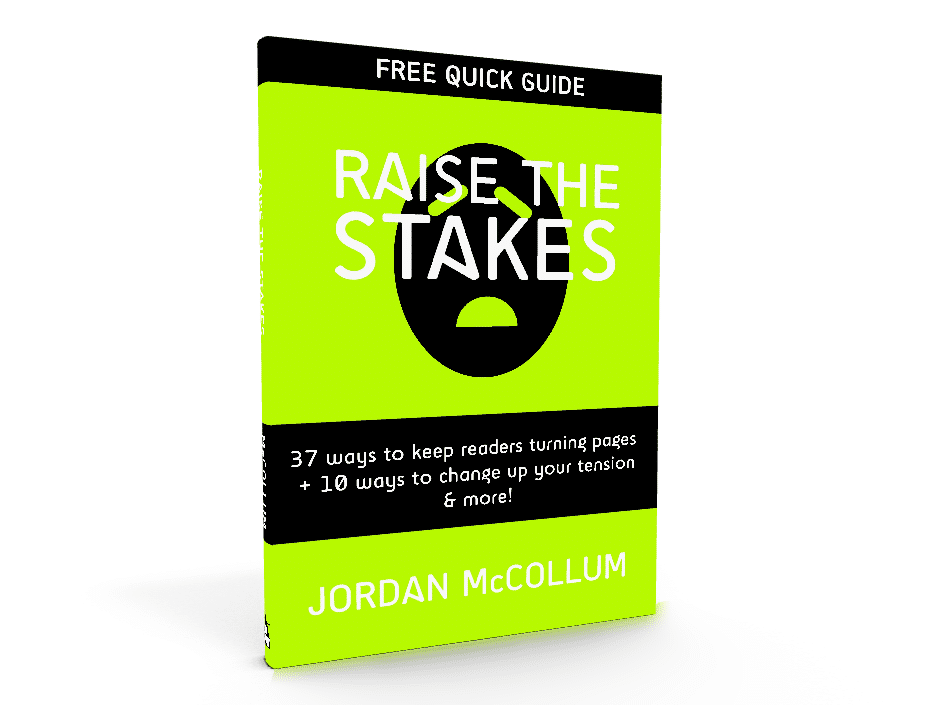Even good backstory can kill a story if it’s not delivered well. We’ve looked extensively at how to weave in backstory, but I think in this “201-level” look, we can go beyond the basic mechanics on a scene level (which we’ve covered before) and look at how backstory revelations should function in a story—and how to keep their delivery smooth.
As we said last time, this has to be the right kind of backstory—something worth waiting for. Hinting at the backstory, “insinuating” it as Chris Roerden puts it (Don’t Murder Your Mystery), can be a driving force for the novel if the “right” backstory is big enough (such as the identity of the murderer).
Hinting at the backstory throughout the story creates suspense by promising some big, important revelation. We’re writing the reader a promissory note, and if the revelation isn’t as big and important as we set it up to be, we can’t give our readers the pay off we promised.
 But as long as our backstory is a big enough deal, suspense is often the main function of backstory. When you keep in mind that you’re trying to raise more questions than you answer (but answer enough questions not to frustrate your reader!), it might be easier to see why (and how) to slip backstory in a “shard” at a time.
But as long as our backstory is a big enough deal, suspense is often the main function of backstory. When you keep in mind that you’re trying to raise more questions than you answer (but answer enough questions not to frustrate your reader!), it might be easier to see why (and how) to slip backstory in a “shard” at a time.
One important thing to remember is that there has to be some “action” in the present to balance the action set in the past. Not fight scenes per se, but some character doing something. If the plot is going to revolve around searching for some truth or story or facts, that search has to be compelling in and of itself. An entire book about a girl sitting down to read her late father’s journal—which she does, successfully, in one sitting, and she counts herself lucky to have known him—isn’t as compelling or interesting as just depicting the backstory (the father’s life) as the “live action” of the story.
There has to be conflict in the present as well as in the backstory we’re revealing—and possibly between the two, as well. Maybe the daughter is going through troubles in her marriage and she reads about her father’s doubts in his marriage. But before she can come to his final choice whether to remain faithful to her mother, the daughter’s husband interrupts her. They have a fight. He takes the journal and burns it. The daughter must set off to find the “other woman” to see what her father chose. She only knows her first name, and so on. Discovering the story isn’t easy—and the character has a compelling reason to want to know the (very important) truth.
And of course, that revelatory truth will most likely come at or around the climax of the story—another reason why this has to be a big promise, and something worth revealing.
What do you think? When a story centers around backstory, how does the delivery differ than in other stories?
Photo by Michael Lehet



I don’t think stories should center around backstories in any event. Yes, there can be a search for the truth…but not as an end in itself. Once revealed, the backstory then propels the story in the present.
Look at how Dan Brown does it. (well…maybe not but it jumped in my head first). His hero searches through archives and other things, but it’s to solve an issue in the present.
There is a whole category of (very successful, both commercially and critically) novels like this. I wouldn’t say Dan Brown’s novels fall into this (admittedly narrow) category. These are more literary novels. And, like I said, it’s essential that there’s action in the present—but the story does still revolve around the discovery.
I’ve used The Secret Life of Bees several times here, where the main character Lily is trying to learn the truth about her mother’s death (and her life). I haven’t read this book, but I think Thirteen Reasons Why would also fall into this category, about a teenager who goes on a journey of discovery why one of his friends committed suicide.
Perhaps the big difference is that the revelation has a bigger impact than on the action of the story: it changes the way the character (and perhaps the reader) understands the world in a way that might not be effectively explored in a novel—it looks like the teenager in Thirteen Reasons Why learns what an impact his actions can have on others. That might be the catalyst for greater action in a story, or it can be the resolution of a story, perhaps shown by one simple action at the end.
You’re definitely right that backstory can be a great catalyst for the action of a story, but in this type of story, that’s not how it functions. (Really, I’m just trying to understand why it does work in these stories, when I feel the same way you do: a story can’t revolve around backstory!)
The worst example of a bad backstory, to me, is Jane Eyre. The beginning is “My life sucks, my life sucks” the middle is “my life is ok” then “OMG, my fiance is married to a mad woman, my life is over” then it ends “real-quick-my-life turned out ok” All the conflict seems to be resolved and told in an after the fact sort of way, “Oh yeah, we got married anyways and lived happily ever after”
Yeah, the whole resolution-happening-off-screen is one of my (MANY) pet peeves.
(But I’ve also never been able to make it that far in Jane Eyre. Sacrilege, I know.)
So I realized that isn’t exactly back story as I was thinking about this on one of my many commutes. Sorry!